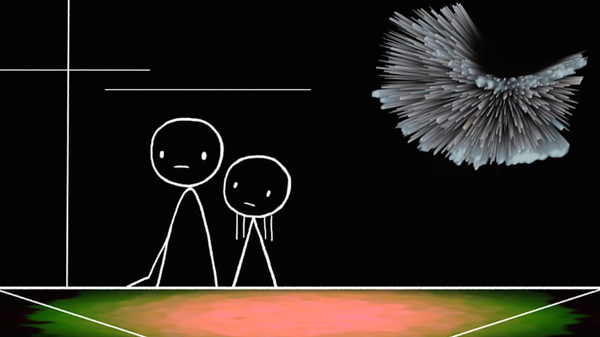Movie review by Greg Carlson
Going into the latest edition of the Sundance Film Festival, Don Hertzfeldt captured the record for most movies screened in competition by a single filmmaker in the festival’s history. And with his win for Short Film Grand Jury Prize, “World of Tomorrow” makes Hertzfeldt the only artist to have collected that honor twice. The new movie represents the next logical step in the animator’s increasingly momentous career. Longtime true believers, stunned by the conclusion of Bill’s journey in “It’s Such a Beautiful Day,” whispered to one another nervously: How could Hertzfeldt possibly create a follow-up to what is, quite simply, one of the greatest animated movies ever made?
The first hint of things to come arrived in the unexpected and delightful surprises packed into the two-minute couch gag for “Clown in the Dumps,” the 26th season premiere of “The Simpsons.” Hertzfeldt’s fabulous, phantasmagoric commentary on the durability of the show many have dismissed for years contextualizes its place in our culture, simultaneously critiquing the commercial ubiquity of its iconic characters (“Make purchase of the merchandise”) and recognizing the special place they earned in our hearts long ago (“Still love you, Homer”). Like he will do in “World of Tomorrow,” Hertzfeldt imagines a distant future that is utterly unique yet anchored in the director’s durable observations of the mundane, everyday, and quotidian.
With his signature absence of capitalization, Hertzfeldt wrote in the journal he shares on his website, “there is something strange about the simpsons that i’ve always wondered about… it’s a 26 year old show that seems to always be set in the current day, yet none of the characters ever age and they usually refer to past episodes as past events in their lives. do the children have memories of events from twenty years ago? but while they don’t age, they do evolve… they’ve changed a lot over the years from the way they were first drawn in season 1. so that was where i wanted to start… what happens when the longest running show on tv just never ends?” Hertzfeldt’s answer to that question, which applies in equal measure to the principal themes explored in “World of Tomorrow,” is assuredly one of the best moments in Simpsons history.
One of Hertzfeldt’s greatest strengths as a storyteller lies in his ability to bring apparent opposites into close proximity. Like the Bill trilogy, “World of Tomorrow” soars with happiness one moment and devastates with sadness in the next. The actions and reactions of the characters are by turns profound, uplifting, pathetic and terrifying. Expanding on several of the visual ideas introduced in his work on the “Clown in the Dumps” couch gag, Hertzfeldt contemplates the biggest questions we can ask of ourselves: What does it mean to be alive? Why are there limits to the time allotted us? How do we love?
Employing digital tools – which he used on “The Simpsons” project – and, for the first time, widescreen, Hertzfeldt introduces us to Emily Prime (Winona Mae, Hertzfeldt’s niece, four years old at the time he recorded her), a little girl visited by her own future clone. The grownup Emily is voiced by Julia Pott, the accomplished British animator and illustrator whose arresting hand-drawn shorts “Belly” (2011) and “The Event” (2012) conjure fully realized worlds in which human-animal hybrids dream of love and friendship while dealing with their severed limbs. The two Emilys – one a child and one an adult but in some sense also the same person – struggle to effectively communicate with each other, but eventually manage to forge a connection.
Hertzfeldt continues to develop his capacity for jet-black comedy and brain-scrambling surrealism, and “World of Tomorrow” is crammed with jokes both visual and verbal that stare down grim, grinning death. Faulty, discount time travel machines drop passengers (and at one point, Emily Prime, like a Gashlycrumb Tiny) in barren snowscapes. Lovely shooting stars are composed of the corpses of the once hopeful. Significantly, the filmmaker’s earnest curiosity blocks out all cynicism, and viewers will take comfort in the cheerful, agreeable openness of Emily Prime. Hertzfeldt’s sensibilities radiate from both Emily Prime’s innocence and the cloned Emily’s bleaker, more wistful worldview (“Now is the envy of all of the dead”). The combination, like Hertzfeldt’s finest work, reminds us that life is short but it can also be so very sweet.
